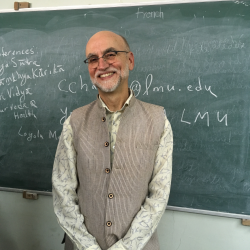
Agenda
Ancient Wisdom
|
Modern Living
Apr 23
2023
9AM-4:10PM PST
2023
9AM-4:10PM PST
9:00 am - 9:20 am
Aparigraha as the Principal Practical Philosophical Tool in Applied Jain Studies
20 mins
Jainism, an Indian philosophical tradition, being one of the most ancient schools of thought in the world, continues to sustain with changing times and progressively not only adapts to the world according to the issues of the globe but also promotes inclusivity to all the paths towards betterment that one may pursue during the course of a lifetime. This inclusive and progressive school of thought owes such nature of its to the doctrine of Aparigraha. Aparigraha is a Jaina doctrine often interpreted as non-attachment or non-possession. Yet the paper interprets Aparigraha as the doctrine of autonomy where all things from their stages of conception to perishment, arise and disappear autonomously. Where there is autonomy comes non-ownership, non-jurisdiction or the idea of no authority over anything. When this autonomy is disrupted, there comes the concept of Himsa. In the metaphysical and epistemological realms, this autonomous nature of Aprigraha leads us to Anekantavada and Syadvada (respectively where everything is multifaceted and every standpoint independently holds its own relative validity), and further in that of an Ethical realm, we find Ahimsa or the doctrine of non-interference of autonomy. This paper holds that the definition of “Applied Jain Studies” can be drawn entirely through the doctrine of Aparigraha. The paper also proposes Aparigraha as the principal practical philosophical tool for praxis in the field of Applied Jain studies and demonstrates how applying the doctrine to the problems of the phenomenal world could render us a significant concrete solution to social, philosophical, environmental and other global issues while including and progressing with the other existent paths for resolutions.
Read MoreRead Less9:20 am - 9:40 am
Simplicity, Letting Go, and Self-Adjustment-Jain Wisdom for Sustainability in the time of difficulties
20 mins
As ancient, profound, and enlightening as it is, Jain wisdom continues to inspire the world like new shoots from an old tree. The ability of religion and philosophy's deep knowledge to stand up to the test of real-world situations is its grounding component, especially the daily life of ordinary people, which does not overlap with the grand narrative. Many people's lives have become significantly more uncertain at a time when the world is changing rapidly and the future is unpredictable. “Applied Jainism” provides people in this situation with specific philosophical and operational methodologies to help them enrich themselves, overcome obstacles, and shift their perspectives. A constant source of sustainability and stability in the different facets of life, body, and mind can be found in the Jain notions of Ahimṣā, Aparigrapha, and Anekāntavāda, as well as in meditation practices and social ties through the lens of “Applied Jainism”. This paper attempts to investigate how the author, as a floating individual, reflects on and practices simplicity, letting go, and self-adjustment in the tides of time, Perhaps the individual scenes of ordinary people can also “see the big picture in a small way”.
Read MoreRead Less10:10 am - 10:30 am
The eightfold path to liberation as described in the Yogapradīpa, a Jain medieval treatise on yoga and meditation
20 mins
This paper will introduce the audience to one aspect of my PhD research. My PhD thesis examines the question of origin and philosophical heritage of a Jain medieval text by the name of Yogapradīpa with the aim of preparing a critical edition with an annotated translation. Consisting of 141 verses, the Yogapradīpa is a treatise on yoga. The main theme of the Yogapradīpa is to see the soul or self (here called: ātman) in the body by means of meditation and in this way leading to the practitioner’s liberation.
The yoga and meditation practice described in the Yogapradīpa is focusing on dhyāna as the highest limb of an eightfold path, thus demonstrating great similarity with the eightfold path presented by Patañjali in classical yoga (where, however, dhyana is surpassed by samadhī as the highest limb).
In my presentation I will elaborate on the instructions for meditation contained in the Yogapradīpa. I will contrast these instructions with some of Patanjali's instructions for meditation and describe the differences and similarities. Further, I will explain philosophical roots and streams of the Jain tradition which may have contributed to form the special way of meditation presented in the Yogapradīpa as well as to the adaptation of the eightfold path.
Read MoreRead Less10:30 am - 10:50 am
Jain Yoga
20 mins
Applied spirituality in the 21st century often takes the form of Yoga practice. Yoga has been part of the Jain worldview for nearly two thousand years. This presentation will investigate how Jain ethics and karma theory align with Patanjali's Yoga. We will also investigate Jain adaptations of this important path.
Haribhadra Virahanka (6th century), Haribhadra Yakini Putra (8th century), Subhacandra (11th century), Hemacandra (12th century), and Yashovijaya (17th century) all commented extensively on the spiritual path of Yoga. They respectively addressed several issues, including ways of Yoga held in common such as Puja and Japa, diverse Yoga schools, ethics and meditation, asana and pranayama, and alignment with Patanjala Yoga. Recent surveys have shown that members of the Jain community are most likely to practice Yoga regularly. This talk will explore how Yoga can serve as a bridge between tradition and contemporary life.
Read MoreRead Less11:10 am - 11:30 am
Applied Jain Studies in Engaged Jain Studies
20 mins
In this presentation, I consider my work as an “engaged scholar” who lives in the tension between “insider” and “outsider” as I both study and practice within the Jain tradition. Within the tradition, I routinely respond to questions from the Jain community regarding how Jain philosophy can be “applied” in everyday life. As a scholar in the field, I remain ever vigilant of the way that my presence in the community and answers to these questions amplify and reshape a very particular instantiation of a globalized, universal Jainism that is particularly important to diasporic Jains who occupy a very particular space in globalized society. In order to illustrate the epistemic tensions I often experience as an engaged scholar, I describe my work with the Jain Vegan Initiative and JAINA over the past several years and how the friction this work entails has productively challenged me as both a scholar and a practicing Jain.
Read MoreRead Less11:30 am - 11:50 am
Applied to What? For Whose Benefit? The Meaning and End of “Applied Jain Studies”
20 mins
This paper takes a community-centric focus to understand the impetus for making “Applied Jainism” central to the charters of endowed chairs in Jain Studies in the US, Canada, and Europe. It examines the charters of several endowed chairs and compares them with similar discourses found in publications meant for Jain communities in North America, such as Jain Digest. By focusing on the topics and issues enumerated in these documents that “Jainism” or “Jain ethics” may be applied to solve, this paper argues that the ultimate purpose of “Applied Jain Studies” is to bolster an identitarian discourse, that is, a process of asserting what it means to be Jain in the world today, especially in the diaspora. As with all such assertions, these claims are not made in a vacuum, but in the context of sectarian, caste, and class differences that characterize Jain communities in India and abroad. In short, such efforts are assertions of those with the ability to influence universities and other deliberative bodies (such as JAINA) to assert claims that appear to be value free or neutral, but which reinforce the ability for some actors to control the narrative of what it means to be Jain. The paper concludes that this is why some topics—such as environmentalism, animal rights, and food—are treated as acceptable within the parameters of championing ahimsa as a “core value” of Jainism, while other applications of nonviolence—such as human rights, anti-fascism, anti-racism, and anti-casteism—are granted almost no attention in these charters and publications.
Read MoreRead Less11:50 am - 12:10 pm
Jain Mantra Healing and the opportunities and challenges of an Applied Jain Studies approach
20 mins
Factors such as environmental degradation, societal and professional pressures, and the covid-19 pandemic have contributed to a growing global preoccupation with mental and physical health. Jains have sought, found, and developed curative practices within their own tradition. The first part of this paper will introduce, historicize, and examine the putative beneficial effects of one such modern practice, Bhaktamar Mantra Healing. This relatively recent practice, which builds on but at the same time radically transforms a well-known Jain text, serves well to start thinking through the deontological difficulties and methodological exigencies of the emerging field of Applied Jain Studies. The second part of this paper will therefore use the example of my own work on Bhaktamar Mantra Healing to seek to delineate this field, and address the relationship between Applied Jain Studies and the study of Jain doctrine, the need to adopt an approach which allows for the inclusion of various at times opposite voices, and the necessity to sensitively but rigorously navigate emic and etic truth claims within such a multivocal reality.
Read MoreRead Less12:50 pm - 1:10 pm
A Pedagogy of Socially Engaged Jainism
20 mins
Like other religions, Jainism is often taught as being as being disengaged from worldly concerns since their locus of value is often believed to be transcendental and otherworldly, causing practitioners to become complacent regarding important social issues, or even complicit with various forms of oppression and domination. This critique can dovetail with stereotypes about the Jain tradition being excessively world-denying, and therefore not providing viable paradigms for resistance against social injustices.
This paper will address these critiques from a Jain perspective by showing how key principles in the Jain faith, such as karma theory and metaphysical frameworks, can be employed in resistance to paradigms of violence and oppression. Understood like this, the Jain tradition does not require a turning away from the world. Rather, the practical and soteriological implications of the tradition may in some cases even be best served by engaging with forms of structural violence such as racism, sexism, colonialism, ecocide, animal exploitation, LGBTQ discrimination, etc. When the Jain tradition is taught in classrooms, this complexity and nuance should be brought to light rather than propagating a stereotype of the tradition that does not represent the majority of its practitioners.
Read MoreRead Less1:10 pm - 1:30 pm
Cookbook Ethics
20 mins
This paper will examine the way food, cooking, and eating are discussed from Jain perspectives by examining contemporary cookbooks written by Jain laywomen and
their relevance for disseminating Jain attitudes towards food.The idea for this paper came from an extra credit exercise offered in my Introduction to Jainism course where I have students read the introduction of Pramoda Chitrabhanu’s Foods of Earth Tastes of Heaven, in which she discusses the proper intention and inner disposition one should have with regard to one’s food. I then have students pick a recipe, cook it at home applying principles she discusses in her introduction, and write a short paragragh about their experience. I intend to look at and compare other Jain cookbooks that seek to teach the community about healthy ways of eating and proper food practices through a Jain perspective as well as discuss ways of using cookbooks as sources for teaching students about ahiṃsā and Jain views on food and cooking.
Read MoreRead Less
Panel 5: Jain Roundtable: Applying Jain Principlies in Everyday Life
Presiding:  Cogen Bohanec
Cogen Bohanec
 Cogen Bohanec
Cogen Bohanec Christopher Jain Miller
Christopher Jain Miller Panelist: Saathvik Devarakonda
Panelist: Saathvik Devarakonda Panelist: Samani Shashi Pragya
Panelist: Samani Shashi Pragya Panelist: Yifan Singharaja
Panelist: Yifan Singharaja Panelist: Corinna May Lhoir
Panelist: Corinna May Lhoir Panelist: Christopher Chapple
Panelist: Christopher Chapple Panelist: Steven M. Vose
Panelist: Steven M. Vose Panelist: Tine Vekemans
Panelist: Tine Vekemans Panelist: Lynna Dhanani
Panelist: Lynna Dhanani Panelist: Anand Vaidya
Panelist: Anand Vaidya Panelist: Subhash Jain
Panelist: Subhash Jain Panelist: Ruchika Chitrabhanu
Panelist: Ruchika Chitrabhanu Panelist: Arpit Mehta
Panelist: Arpit Mehta Panelist: Raj Shah
Panelist: Raj Shah Parveen Jain
Parveen Jain